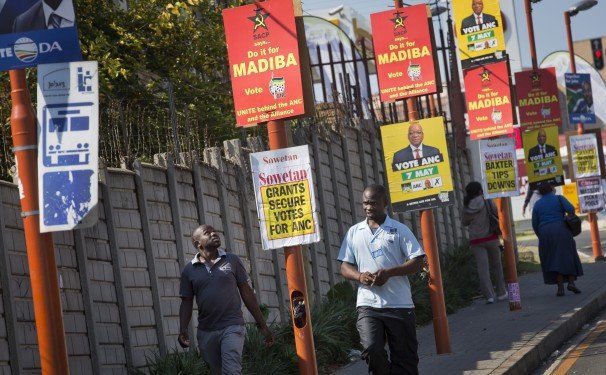
South Africa is voting in general elections as it marks 20 years since the end of white-minority rule.
The African National Congress (ANC) is tipped to win, returning President Jacob Zuma for a second five-year term.
These are the first elections since the death in December of Nelson Mandela, South Africa’s first black president.
Correspondents say voting has begun smoothly with long queues and there is an air of excitement, especially amongst first-time voters.
Those born after the end of apartheid in 1994 are casting their first national ballots.
Correspondents say police have been deployed to areas where there have been scene of violent protests and political tensions.

The ANC is expected to win more than 60% of the vote, but its campaign has been hit by concern over economic problems such as high unemployment and a number of corruption scandals.
Opinion polls show there is disaffection with the country’s leadership but it is not clear whether this will translate into a significant swing to either main opposition party – the Democratic Alliance, led by anti-apartheid activist Helen Zille – or the newly launched Economic Freedom Fighters, headed by former ANC youth leader Julius Malema.
The polling station is at Orlando West High, a school steeped in the anti-apartheid struggle history and not far from Nelson Mandela’s old home.
Those lining up acknowledge the problems of corruption and high unemployment but say they are voting for all the years black people were denied the right to vote under racial oppression.
The ANC’s campaign has drawn heavily on past glories and on the outpouring of grief over the death last year of Nelson Mandela.
“Do it for Madiba, Vote ANC!” campaign posters read, referring to Nelson Mandela by his clan name.
But many commentators say this election could be the last to be dominated by South Africa’s post-apartheid legacy.
About a quarter of South Africa’s workforce is jobless and unemployment is the major issue among young voters, followed by education.
Some 22,000 polling stations are open at schools, places of worship, tribal authority sites and hospitals, while dozens of vehicles serving as mobile voting centers will operate in remote areas.
About 25 million people have registered to vote – roughly half the population.
Police say at least one officer will be on duty at every polling station and troops have also been deployed to keep order at various hotspots.
There was rioting in Bekkersdal township, south-west of Johannesburg, on Tuesday and reports that some temporary polling stations had been burned down.
Bekkersdal has suffered intermittent unrest since last year as residents protested over a lack of public services. Many have vowed to boycott the election.
Polls opened at 07:00 and are due to close 14 hours later.
President Jacob Zuma cast his ballot at his Nkandala homestead in rural KwaZulu-Natal while Helen Zille voted in Cape Town, which is under the control of her party.
The full result is not expected before Friday.
[youtube iQMNyOqy2tQ 650]